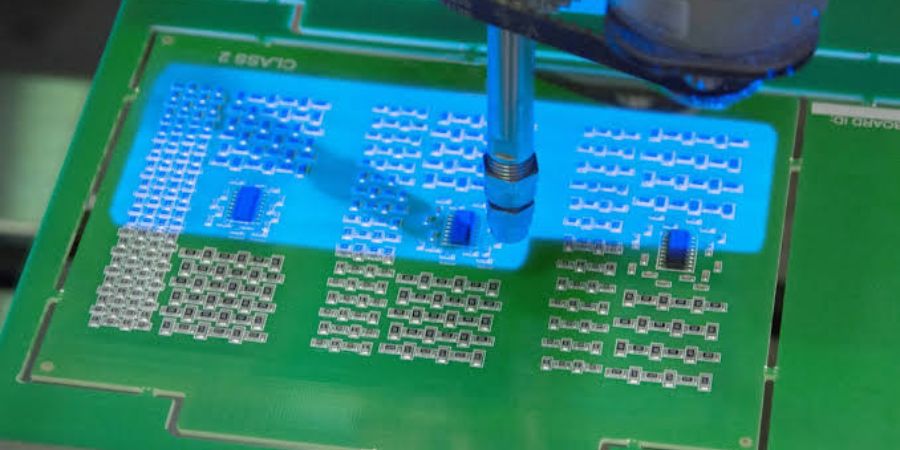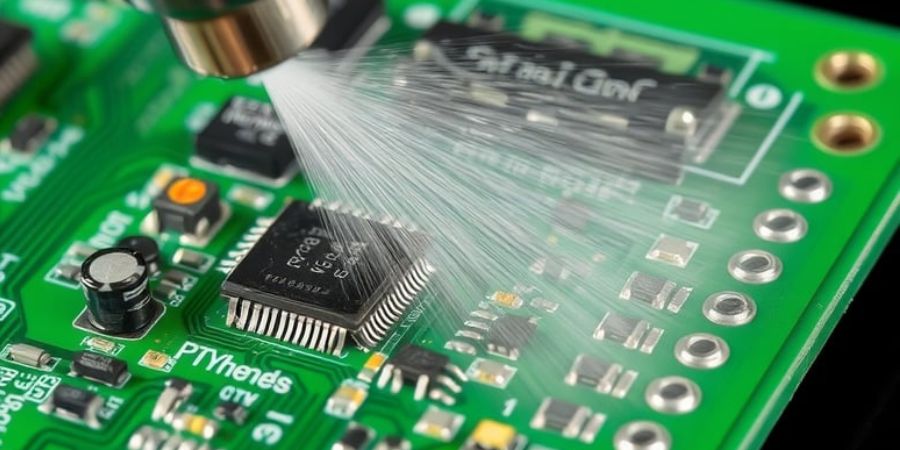Latest Developments in Conformal Coating:
Introduction:
Protecting your printed circuit boards well in harsh environments can extend their operating life by many years. One if the most popular and cost-effective ways to do this is by using a conformal coating, which reduces the requirements for servicing, components replacement or even replacing the PCB.
It is to meet the high-reliability requirements of the defense, automotive industrial and aerospace industries that coatings are used. They protect circuits against a combination of moisture, aggressive chemicals and vapors, salt spray, mechanical vibration and even organic attacks from fungus. Conformal coatings are also commonly used in consumer appliances that are susceptible to environmentally induced field failure, such as mobile phones and washing machines.

Key characteristics of conformal coating:
Conformal coatings should ideally possess as many of the following characteristics as possible:
- Have low viscosity
- Offer spray, dip, select or flow-application options
- Have a long pot life
- Should cure rapidly, leaving no by-product
- Should enable sufficient under-component cure
- Reparability
- Have a wide range of operating temperatures
- Be non-toxic
- Low cost
- Demonstrate robust adhesive properties
The latest technological advancements in conformal coating:
There have been a number of new products in the conformal coatings market from several industry players in the last few years. Let’s take a look at some of the products launched in the last one year by two leaders in this field – Electrolube and HumiSeal
Electrolube, the global electro-chemicals manufacturer, has recently formulated and launched a brand new conformal coating product. It has been developed to address a number of issues experienced by a specific user (a large manufacturer of power distribution electronics) of surface modifier materials.
The company’s rationale for using a surface modifier coating as opposed to a conventional conformal coating was based on two requirements – the coating thickness of 2 microns (micrometer) and the very low film strength (abrasion resistance) which can facilitate huge processing benefits.
The new, non-flammable, fluorinated polymer coating (FPC), underwent a series of customer tests, including the highly stringent salt mist, humidity and mixed corrosive gas testing; and it successfully passed all the tests. Extensive connectivity testing confirmed noticeable improvements when compared to the previous results experienced by the user, while the inclusion of a UV trace meant the boards were now far easier to inspect for coverage. Overall, the new FPC coating has resulted in a significant cost saving too. It is also suited for mobile phone applications, specially for the protection of the LCM (liquid crystal module).
Electrolube has also launched a new solvent-free conformal coating range, which combines the best properties of resins with the application ease of a conformal coating.
The innovative two-part conformal coating series, called ‘2K’, comprises a range of products – 2K100, 2K300, 2K350, 2K500, 2K550, and 2K850 -each of which meets a host of specifications, and is fully IPC-CC-830, RoSH-2 and REACH compliant.
2K100 conformal coating:
The general purpose 2K100 system is a soft, highly flexible, hydrophobic coating with an operating temperature range of -40 degree C to +100 degree C. It provides low stress on components an demonstrates good resistance to salt mist, chemicals and condensation, making it suitable for automotive applications.
2K300 conformal coating:
The 2K300 is a highly elastic, solvent-free two-part polyurethane coating which provides good coverage even in tight spaces, while its extreme flexibility offers protection around delicate components. It is also hydrophobic and highly resistant to condensation, salt mist and chemicals, but offers a broader thermal performance range (-40 degree to +130 degree C) than the 2K100.
2K500 conformal coating:
The new 2K500 two-part system can be used for tougher applications, as it is more abrasion-resistant than the 2K100 or 2K300 and has a wider operating temperature range, providing protection for electronics exposed to temperature over a long period of time. It also has good thermal shock resistance. The 2K500 is mechanically robust, offers increased thermal endurance (-40 degree to +140 degree C) and ensures good adhesion to any substrate. It even maintains clarity after prolonged exposure to UV light.
The 2K350 is a solvent-free coating which is opaque blue for ease of inspection. The UL94V-0 complaint coating is highly flexible and effectively combines the protection and properties of an encapsulation resin with the ease of a coating application. The 2K350 has an operating range of -40 degree to +130 degree C and provides good coverage in tight spaces., while its flexibility offers protection even around delicate components. The hydrophobic coating offers good water immersion, as well as salt mist and humidity protection, making it suitable for automotive electronics.
2K550 conformal coating:
The new 2K550 is a tough, flexible, high-performance coating. It provides the protection of a resin along with ease of application of a conformal coating. This UL94V-0 complaint coating is characterized by greater coating thickness and enhanced edge coverage. It has improved adhesion, hardness and scratch resistance. The 2K550 has clarity as well as resistance to discoloration, humidity and condensation. The new coating also features a fluorescent trace to aid inspection.
2K850 conformal coating:
The 2K850 combines the features and benefits of the 2K system, with the speed and convenience of UV curing, enabling a tack-free coating. Once the two components are mixed, a predictable chemical reaction guarantees a complete cure at room temperature within 24 hours, thereby enabling board calibration or further processing. In contrast, most of the single-part UV cure systems currently available require moisture to diffuse through the UV-cured coating sections.
The 2K850 system features a wide operating temperature range of -40 degree to +130 degree C with good thermal shock performance. The tough, flexible, high-performance, UL94V-0 complaint coating is characterized by greater coating thickness and enhanced edge coverage, as well as improved adhesion, hardness and scratch resistance.
Traditionally known for being a leading manufacturer of conformal coating products, HumiSeal has expanded its portfolio of products following the recent acquisition of Resin Design. Its new product, the UV50LV is a one-part, low-viscosity, high-solids, dual-cure acrylate polyurethane conformal coating with good chemical resistance, flexibility and moisture resistance. Developed at a low viscosity to allow application with a film coater type selective coating system, the UV50LV is tack-free after exposure to UV light. Also, secondary moisture cure mechanism can fully cure any unexposed areas of the coating within seven days, at ambient conditions.
Another new addition recently launched by HumiSeal is a series of low-energy, LED cure coatings. The coatings under the UV300A series are one-part, high-solids, dual-cure acrylate polyurethane conformal coatings, possessing all the performance benefits of the original HumiSeal UV coatings, but with the additional benefit of the LED cure capability.
HumiSeal’s synthetic rubber coatings, the 1B51 and 1B59, have been developed in response to the performance requirements of smaller devices that work at higher operating temperatures. The technology used in these coatings boasts of moisture protection, low stress and high flexibility which indicates a good ability to withstand thermal shock as well as good adhesion to various types of substrates.
How to select best conformal coating:
Inputs from industry experts have helped us to put together the crucial factors that need to be kept in mind while selecting conformal coatings. The following factors are needed while buying conformal coating:

- Operating temperature range: Conformal-coated assemblies will often be exposed to a wide range of operating temperatures during their service life. It is important to be aware of the maximum and minimum temperatures that the unit will be exposed to.
- Environmental considerations: A conformal coated PCB gets exposed to different types of corrosive environments. In order to prevent damage in the future, common dangerous environmental conditions should be factored in when selecting a coating.
- Suppliers’ performance: Choosing a conformal coating material is a long and exhaustive process, with many considerations and conflicting requirements that mean making certain tradeoffs. If the suppliers are unwilling or unable to help you through the selection process, then they are unlikely to be of much help with any subsequent issues that may need to be resolve. Getting adequate support and backup prior to qualification is an indicator that the supplier knows the business well enough to become a vendor who adds value during prouction.
- Price: Often, materials are selected on the basis of price alone. Although this is an important consideration, all the other factors are arguably as important, if one wants to make the best choice.
You May Like Read:
